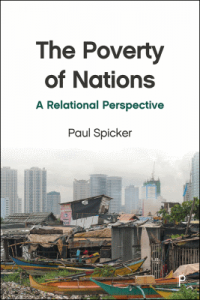I attended a session the other day that was intended to discuss the Scottish Goverment’s current plans for tackling child poverty. A word that was used repeatedly in that document, and so in the presentations, jarred with me. The word is ‘holistic’. The plan promises a ‘holistic’ response at many points, and in a range of different contexts – such as employability, support, income generation. What could be wrong with that?
To my mind, there are three great flaws in this approach. The first is the implicit assumption, in much of this, that the appropriate way to respond to poverty is ‘person-centred’, personal or individualised. Here are some examples:
We will invest [in] Whole Family Wellbeing Funding … This will help transform services that support families to ensure that all families can access preventative,
holistic support which is wrapped around their needs, and provided when they need it and for as long as they need it.Through direct efforts to get more cash in the
pockets of families now, alongside a genuinely holistic, person-centred package of family support, we can help to ensure families receive the right support at the right time, for as long as they need it, creating the conditions for families to navigate their way out of poverty.It takes all of us, across Scotland, working together – united in focus and purpose – to deliver the change to how public services are delivered, moving to a person-centred holistic approach to supporting families.
In the published document, there are more than thirty similar phrases to choose from. It should be recognised, however, that the circumstances that lead people to be in poverty are not, for the most part, specific to the individual or of the family. The central purpose of the strategy is not to deal with the individual circumstances of poor families, but to reduce overall the numbers of people who are falling into poverty. To do that, the focus has to be, not just on those who are poor currently, but on the throughput – the very large numbers of people, actually most of the population, who will pass through poverty for an extended period. That calls for a structural perspective, not an individualised one.
There are strong hints in the figures where the problems are likely to be concentrated. Why, for example, are most children of young mothers likely to be poor? The answer has little to do with personal or individual factors. It’s because the capacity of women to earn is critical to household income, the children of young mothers are far more likely to be young, and young children have to be looked after. The situation calls for higher income for people with responsibility for children, and extensive, affordable child care – ours is almost the most expensive in the OECD.
The second problem about the claim to be providing ‘holistic’ services is that it’s not true. It doesn’t happen, anywhere, ever. The reason why we have medical practices delivering health care, schools providing education and social security providing money is that these are all things that matter, that need to be done, and require specific routes and channels to be delivered. We often hear the complaint that Scottish services are based in ‘silos’. Of course they are. The doctor doesn’t teach your children to read, the social security officer doesn’t allocate houses and the social worker is not there to take your appendix out. It’s true that specific services can be transformative, changing every part of a person’s life. Decent housing can turn someone’s life around in days, but that doesn’t happen because of an holistic assessment; it happens because housing is so important for people’s lives. The most effective strategies for dealing with poverty have generally worked by focusing on one of the elements that lead people to be deprived – elements such as health care, education, income support or housing – and removing part of the burden from poor people.
The third issue is about policy. Targeting resources on poor families has a clear value here and now, but it is not the only way to deal with the problems. We could do much more. To safeguard people now and in the future, we need to change the conditions which underlie the experience of poverty. I have already given the example of child care; that needs to be done as a universal basic service, not a process targeted on poor families. Let me take another: the case for free school meals. That contributes to poverty reduction precisely because it is universal and basic. Neither child care support, nor free school meals, are ‘holistic’ policies. The same arguments extend to a wide range of services – energy, communications, transport. Public services can make a major contribution in improving the command over resources of people on low incomes.
